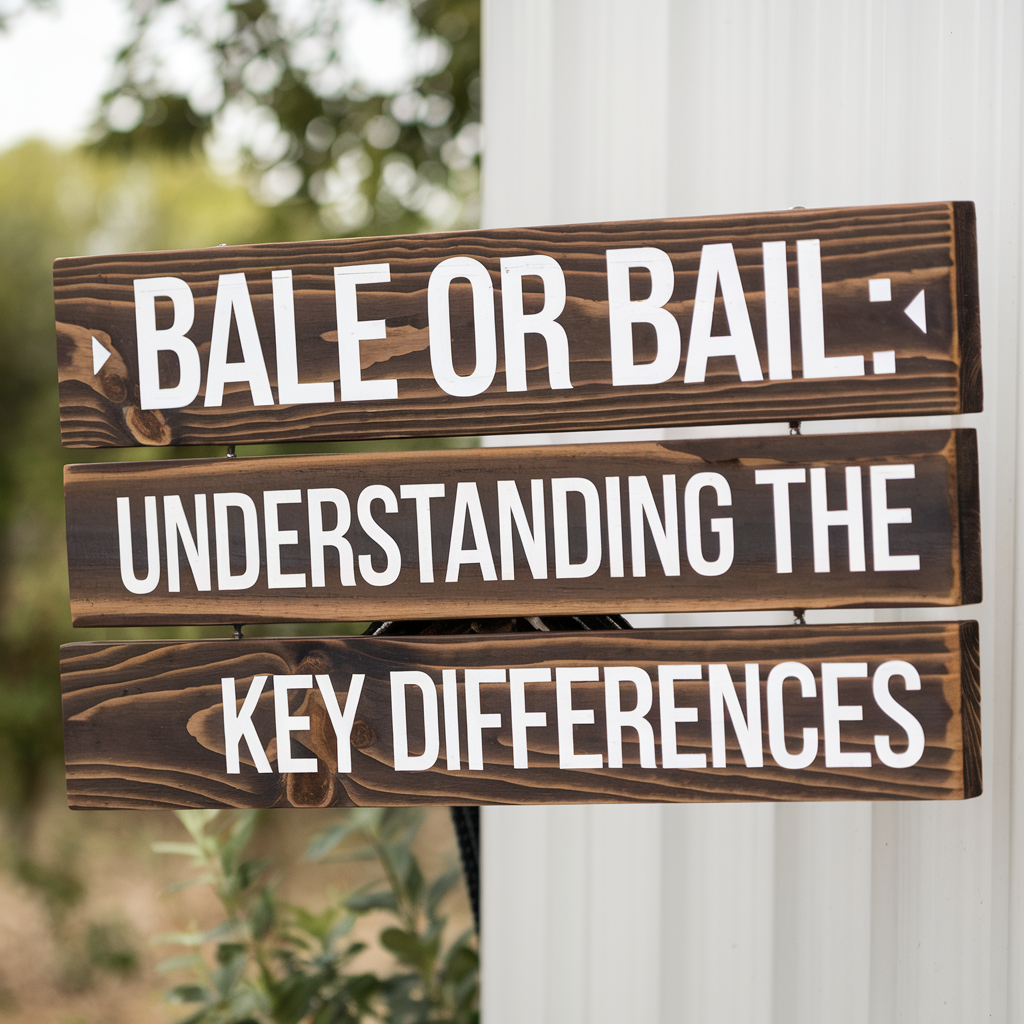Introduction
The English language is full of homophones—words that sound the same but have different meanings. One common confusion is between bale and bail. Though they sound identical, their meanings and usage are completely different. Understanding these key differences ensures clear and precise communication, especially in legal, financial, and agricultural contexts.
This article breaks down their definitions, usage, and meanings, along with example sentences to help you master these terms. By the end, you’ll know exactly when to use “bale” and when “bail” without second-guessing.
Definition and Etymology
Bale
- Definition: A large bundle of something that is tightly bound for transport or storage.
- Etymology: Derived from the Old French baille, meaning “bundle.” Used in English since the 14th century.
- Usage: Common in agricultural and industrial settings.
Bail
- Definition: Can mean to remove water from a boat, provide money for temporary release from jail, or abandon something.
- Etymology: The legal meaning comes from the Old French baillier (“to deliver or hand over”), while the nautical meaning originates from the Latin bajulare (“to carry or lift”).
- Usage: Found in legal, financial, nautical, and informal contexts.
Key Differences Between Bale and Bail
| Feature | Bale | Bail |
|---|---|---|
| Meaning | A large bundle of material | To secure release, remove liquid, or exit a situation |
| Common Usage | Agriculture, shipping, storage | Legal, financial, nautical, informal |
| Example | “A bale of hay” | “Post bail for a defendant” |
| Part of Speech | Noun | Verb & Noun |
Meanings and Uses of “Bale”
The word bale frequently appears in agricultural, industrial, and literary contexts.
Common Uses of “Bale”
- Agriculture: Farmers use bales of hay, straw, and cotton.
- Industrial: Factories compress goods into bales for transport.
- Figurative Use: “A bale of woe” means great sorrow.
Example Sentences for “Bale”
- The farmer stacked bales of hay in the barn.
- The company shipped bales of recycled paper.
- The poet wrote about a bale of trouble facing the kingdom.
Meanings and Uses of “Bail”
The word bail is more versatile, appearing in legal, financial, nautical, and informal situations.
Read More About This Article: Cacoon or Cocoon – Which Spelling Is Correct?
Common Uses of “Bail”
- Legal/Financial: Posting bail to secure someone’s temporary release from jail.
- Nautical: Bailing water out of a leaking boat.
- Slang: “Bailing out” means quitting or leaving abruptly.
Example Sentences for “Bail”
- He had to post bail to get out of jail.
- The crew worked hard to bail water from the boat.
- She decided to bail on the boring meeting.
Situational Contexts: When to Use “Bale” vs. “Bail”
Understanding context makes it easier to choose the right word.
When to Use “Bale”
✔️ Referring to physical bundles of material. ✔️ In agricultural settings, like hay and cotton bales. ✔️ In shipping and industrial use.
When to Use “Bail”
✔️ In legal or financial matters involving bail money. ✔️ When discussing removing water from a boat. ✔️ In everyday usage referring to leaving a situation suddenly. ✔️ When escape or withdrawal is implied.
Common Mistakes and How to Avoid Them
Mixing up “bale” and “bail” is common. Here’s how to avoid confusion:
1. Memory Trick
- Bale → Think of “bundle” (both start with “B”).
- Bail → Think of “exit” or “escape,” especially in informal settings.
2. Use Mnemonics
- “Bales of hay are packed and stay.”
- “Bail means to pay or stray away.”
3. Check the Context
- If the sentence involves law, water, or leaving, “bail” is likely correct.
- If it’s about bundles, then “bale” is the right choice.
Final Thoughts
Both bale and bail have distinct meanings. Using them correctly prevents miscommunication, especially in legal, financial, and agricultural discussions. Keep practicing, and choosing the right word will soon feel natural.
Key Takeaways
✔️ Bale refers to physical bundles, commonly used in agriculture and shipping. ✔️ Bail involves legal, nautical, and informal contexts, often meaning to exit or remove water. ✔️ Understanding context is the best way to master these words.
Next time you write, pause and check: Do you mean a bundle (bale) or an action related to law, water, or leaving (bail)? With practice, you’ll never mix them up again!
